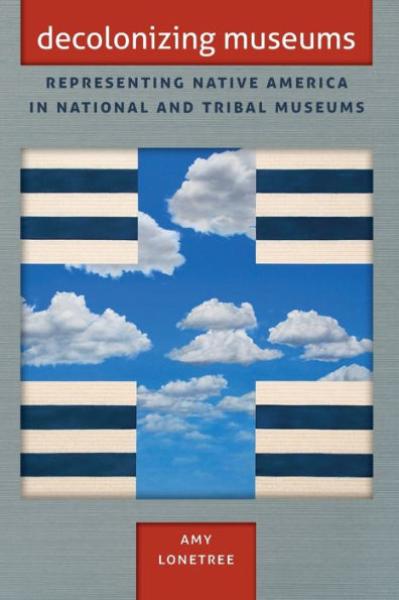Description
Lonetree focuses on the representation of Native Americans in exhibitions at the Smithsonian's National Museum of the American Indian, the Mille Lacs Indian Museum in Minnesota, and the Ziibiwing Center of Anishinabe Culture and Lifeways in Michigan. Drawing on her experiences as an Indigenous scholar and museum professional, Lonetree analyzes exhibition texts and images, records of exhibition development, and interviews with staff members. She addresses historical and contemporary museum practices and charts possible paths for the future curation and presentation of Native lifeways.
Decolonizing Museums: Representing Native America in National and Tribal Museums
Amy Lonetree (Ho-Chunk) is associate professor of American studies at the University of California, Santa Cruz, and co-editor, with Amanda J. Cobb, of The National Museum of the American Indian: Critical Conversations. She is co-author of People of the Big Voice: Photographs of Ho-Chunk Families by Charles Van Schaick, 1879-1942.
[An] interesting and important new book.--Anthropology Review Database
A challenging and, at times, heartbreaking text. . . . Should be mandatory reading, for graduate level anthropology, museum studies, arts administration, and history classes dealing with Native American cultures and representation. Working museum professionals will gain much from this book, as well.--Journal of Folklore Research
A lucid, direct, and cogent argument for what the criteria should be for a museum to be considered decolonized. . . . An essential source for museum practitioners, both Native and non-Native.--Great Plains Quarterly
A personalized account that is both thought-provoking and insightful.--American Indian Quarterly
An important new volume for understanding museum representation in different contexts.--Ethnohistory
Ask[s] provocative and important questions about how museums engage with indigenous communities, and challenges the field to think critically about ingrained behaviors and methodologies that privilege the perspectives of the colonizer.--Museums and Social Issues
Her larger question is how to decolonize museums and, perhaps most poignantly, whether the form of the museum can ever truly be decolonized.--American Quarterly
Lonetree analyzes the complexities of developing exhibitions through collaborations between museum curators and Native communities, with the goal of telling stories that honor the Native worldview and way of knowing, challenge stereotypes, and speak the hard truths of colonization.--Minnesota Historical Society Press
Lonetree does an admirable job of incorporating Native American storytelling preferences into a kind of scholarly discourse that is insightful, critically astute, and a pleasure to read.--Journal of American Ethnic History
Lonetree generates compelling ideas for discussion and debate in the museum field, and these ideas call for practical application in museums and sites of cultural representation.--Collaborative Anthropologies
Lonetree offers a powerful and meditative study. . . . [It] is an uncompromising yet candid statement that no matter how far Western museums have come in their representations of Native Americans, there is still much work to be done.--Indigenous Peoples' Issues and Resources
Offers an excellent overview of Indigenous museum representations since the late nineteenth century.--Journal of the Native American and Indigenous Studies Association
Provides the reader with an easy-to-follow breakdown of the concept of decolonization within the context of museums. . . [and] is well written and carefully structured.--History News
This book is written in a clear and accessible fashion, suitable for scholars and professionals as well as undergraduate students. . . . I highly recommend this book to museum professionals, museum studies scholars, anthropologists, historians, and students of museum theory and practice.--Collaborative Anthropologies
This excellent, thoughtful, and provocative book unpacks and scrutinizes, through three case studies, the current consensus that contemporary museological methods are leading to a decolonization of the museum.--Museum Anthropology
Thoughtful and compelling. . . . Recommended. All levels/libraries.--Choice
Product Details
- University of North Carol Brand
- Nov 19, 2012 Pub Date:
- 0807837156 ISBN-10:
- 9780807837153 ISBN-13:
- 221 Pages
- 9.1 in * 6.1 in * 0.6 in Dimensions:
- 1 lb Weight:




